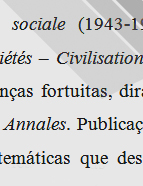

................................
And if one cannot imagine Eduardo Borges Nunes' interest in the Annales, one can only assume that José António Ferreira de Almeida, who may be characterised as an unrecorded but extremely well-informed historian, would not follow the paths of innovation between 1952 and 1961, the years during which he lectured on the History of Portugal at the Faculty of Lisbon.
However, in the 1960s, and only then, the presence of Luís Ferrand de Almeida and António de Oliveira at the Faculty of Arts of Coimbra also became a path for the most recent historical research, with its ebbs and flows conditioned by the uncertainty of the times, but with particular attention to what was being accomplished in Paris. Thus, economic and social history, attentive to the Annales, inspired the work of those assistants (at the time) and even the dissertations of young undergraduates which the Faculty did not intend to control. In 1962, José António Ferreira left Lisbon to teach at the re-founded Faculty of Arts of Porto. Although his publications were limited, he was an immensely knowledgeable master and an excellent lecturer - Godinho stated that he knew more History than any other Portuguese citizen - who would use the modern and open historiographical fields shown by the Annales. The undergraduate dissertations he supervised bear this mark. But the Faculty of Letters of Porto, directed by a historian with a deep-seated erudite tradition and with highly conservative professors, would only later, after 1974, commit to methodological and thematic novelties. In the meantime, it wallowed in the flavour of well-known and well-proven methods.
Thus, volens nolens, from the 1940s onwards, Portuguese historiography became influenced by what was being published in France, and especially by the authors of reference who established themselves through the Annales: especially Marc Bloch and Lucien Febvre , and in the late 1940s Fernand Braudel and, later on, the disciples of the former authors, namely Emannuel Le Roy Ladurie, Pierre Goubert, René Baehrel, Frederic Mauro, Pierre Chaunu, Albert Silbert and many others. It should be noted that Vitorino Magalhães Godinho was an integral part of this group, as was Gentil da Silva, and that Luís de Matos and Joaquim Barradas de Carvalho were directly influenced by what was happening in Paris at the École Pratique des Hautes Études (IVe section), which they had both attended, although at different times.
